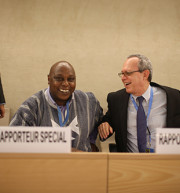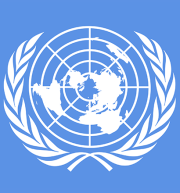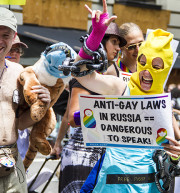
GENEVA – Special Rapporteur Maina Kiai today urged UN member states to protect the assembly and association rights of all people within their borders – including those who are “seen as being different” and may be marginalized as a result. Kiai’s remarks were delivered to the Human Rights Council on June 10-11 in Geneva, where he presented three reports – a thematic report on the assembly and association rights of groups “most at risk,” a country report on his official mission to Rwanda, and third on communications transmitted to UN Member States. The Special Rapporteur’s most recent thematic report documents the challenges faced by marginalized groups in exercising – or seeking to exercise – their rights to freedoms of peaceful assembly and of association. These groups, deemed “most at risk,” include persons with disabilities; youth; women; lesbian, gay, bisexual, transgender and intersex (LGBTI) people; members of minority groups; indigenous peoples; internally displaced persons; and non-nationals, including refugees, asylum seekers and migrant workers. “It matters not whether we approve or support the activities of these marginalized groups at risk,” Kiai told the Council. “The test of international law is that as long as their activities are non-violent,... Continue reading →

GENEVA – United Nations Special Rapporteur Maina Kiai will appear before the 26th Session of the UN Human Rights Council on June 10 to present his latest reports – one on his official mission to Rwanda and another focusing on the assembly and association rights of marginalized groups. He will also present a third report on observations on communications transmitted to Governments and replies received between March 1, 2013, and February 28, 2014. Kiai, who is the UN Special Rapporteur on the rights to freedom of peaceful assembly and of association, is scheduled to present at the Council’s afternoon session on June 10, which begins at 12:30 p.m. local time; his presentation may run into June 11, depending on the length of other agenda items. The session will be broadcast live on http://webtv.un.org/. Thematic Report: Groups Most At Risk Kiai’s thematic report documents the challenges faced by marginalized groups in exercising – or seeking to exercise – their rights to freedoms of peaceful assembly and of association. These groups, deemed “most at risk,” include persons with disabilities; youth; women; lesbian, gay, bisexual, transgender and intersex (LGBTI) people; members of minority groups; indigenous peoples; internally displaced persons; and non-nationals, including refugees,... Continue reading →

The United Nations has publicly released Special Rapporteur Maina Kiai’s third thematic report to the Human Rights Council, in advance of Kiai’s presentation of the report to the Council in June. The report focuses on the challenges facing those most “at risk” when exercising their rights to freedom of peaceful of assembly and of association. This category includes individuals and groups that are often relegated to the margins of society, both in their daily lives and in the exercise of their rights. Some of the groups considered in the report include persons with disabilities; youth, including children; women; lesbian, gay, bisexual, transgender and intersex (LGBTI) people; members of minority groups; indigenous peoples; internally displaced persons; and non-nationals, including refugees, asylum seekers and migrant workers. “Two thousand fourteen is shaping up to be the year of the protest, with the news dominated by stories of mass demonstrations in Ukraine, Venezuela and elsewhere,” said Kiai, who recently began his second three-year term as Special Rapporteur on the rights to freedom of peaceful assembly and of association. “But the crackdown on assembly and association rights extends far beyond what we see in the headlines.” “Those at the margins of society face vicious... Continue reading →

Backlash from the Arab Spring of early 2011 continues to be felt globally, with space for civil society actors increasingly shrinking. In recent years many States have responded to people’s assertions of peaceful dissent by violently clamping down on peaceful protests and other forms of assembly, unduly restricting the ability of associations to form and operate, and physically assaulting civil society actors. While those actions have negatively affected all who exercise their rights to peacefully assemble and freely associate, certain groups are at particular risk of having their space all but vanish. In this report, UN Special Rapporteur Maina Kiai focuses on the challenges facing groups that are often relegated to the margins of society, both in their daily lives and in the exercise of their rights to freedom of peaceful assembly and of association. He hopes to cast the spotlight on the ways in which the denial of the rights to freedom of peaceful assembly and of association leads to the marginalization of those groups and how marginalization exacerbates their inability to effectively exercise their rights. Some of the groups that are considered in the present report to be most at risk are persons with disabilities; youth, including children; women; lesbian, gay, bisexual, transgender and intersex... Continue reading →